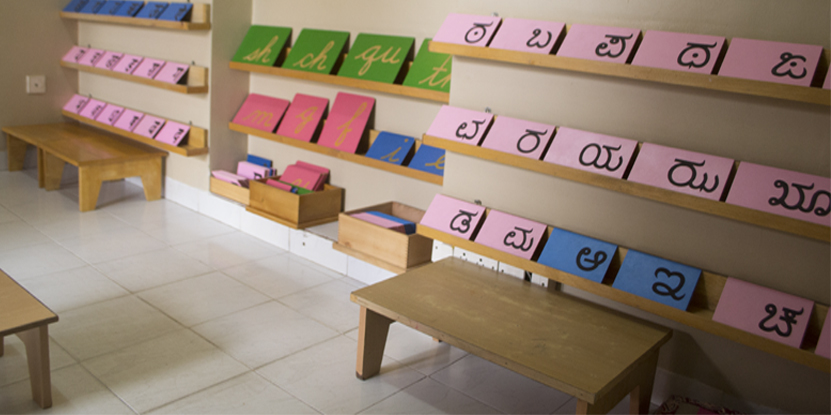PROGRAM : HOUSE OF CHILDREN
The Montessori program offered at the early childhood level, ages 2 ½ years to 6 years, is based on traditional Montessori principles of multi-sensory and sequential learning. Specially designed equipment and learning resource provides interesting and valuable learning opportunities for children at a self-directed pace. The various activities offered to the child help him appreciate the world around him and aids adaptation.
Curriculum of CH program:
The Children’s House Programme is a gathering of children between the age group of 2 ½ years to 6 years. In a carefully prepared environment the Guide relies on her observations of the children to determine activities she may introduce to an individual child or to a small or large group. The aim is to encourage active, self-directed learning. The key areas of learning are:
-
Exercises of Practical Life
-
Sensorial Activities
-
Language
-
Mathematics
-
Cultural Subjects
The key areas of learning are
-
Exercises of Practical Life:
The Exercise of practical life activities are those the children see done in their own homes. The exercise of practical life enables the child to develop control of movement, concentration, self-discipline, and the ability to complete a cycle of activity.
-
Sensorial Activities:
The Sensorial materials provide a particular purpose of using the child’s hands and senses for spontaneous activity. Montessori emphasizes learning through all the senses, not just through listening, watching or reading. All the materials provide particular sensorial experience in isolation. The sensorial material helps them distinguish, categorize and become aware of physical properties of matter around them like dimensions, colour texture and shapes. The children match, grade, order, or explore by tasting, smelling, touching, listening, or seeing. The foundation for cultural subjects is laid with sensorial activities.
-
Language:
The Montessori language program is based on a strong foundation of phonetics. English language with all its orthographic difficulties is presented in a very meticulous and logical manner. The phonetic approach equips the child to pen his thoughts freely. A non-corrective mode in the class facilitates child’s creative writing.
-
Arithmetics:
The Montessori mathematical materials allow children to begin their mathematical journey from the concrete to the abstract through manipulation, experimentation and intervention.
-
Culture:
The introduction to cultural subjects is made as extensions of the sensorial materials and language activities. Art, music, geography, history, botany, zoology, and science are integrated into a holistic approach to living and learning in our human family, on our planetary home across cultures and throughout history. Through nature, story, music, art, and food the guide fosters in the children a reverence and love for all of creation.
Independence forms a key aspect in a Montessori environment; independence of the mind and body. Children are encouraged to learn and explore ideas after having been offered different tools of learning.The mixed age group gives the children ample opportunities to share, care and help each other. They can be seen taking decisions and resolving conflicts with ease as they happily go about their work. This keeps a Montessori environment dynamic, vibrant and bustling with activities.
In this video, we have tried to capture the day of a child from the Children’s House Programme at The Montessori School. Ved (4.5 years old) begins his day at 9 a.m and works until 2.30 p.m every day. One can see here how he engages in many activities one after the other, engrossed.
"These very children reveal to us the most vital need of their development, saying 'Help me to do it alone!'" – Dr. Montessori
